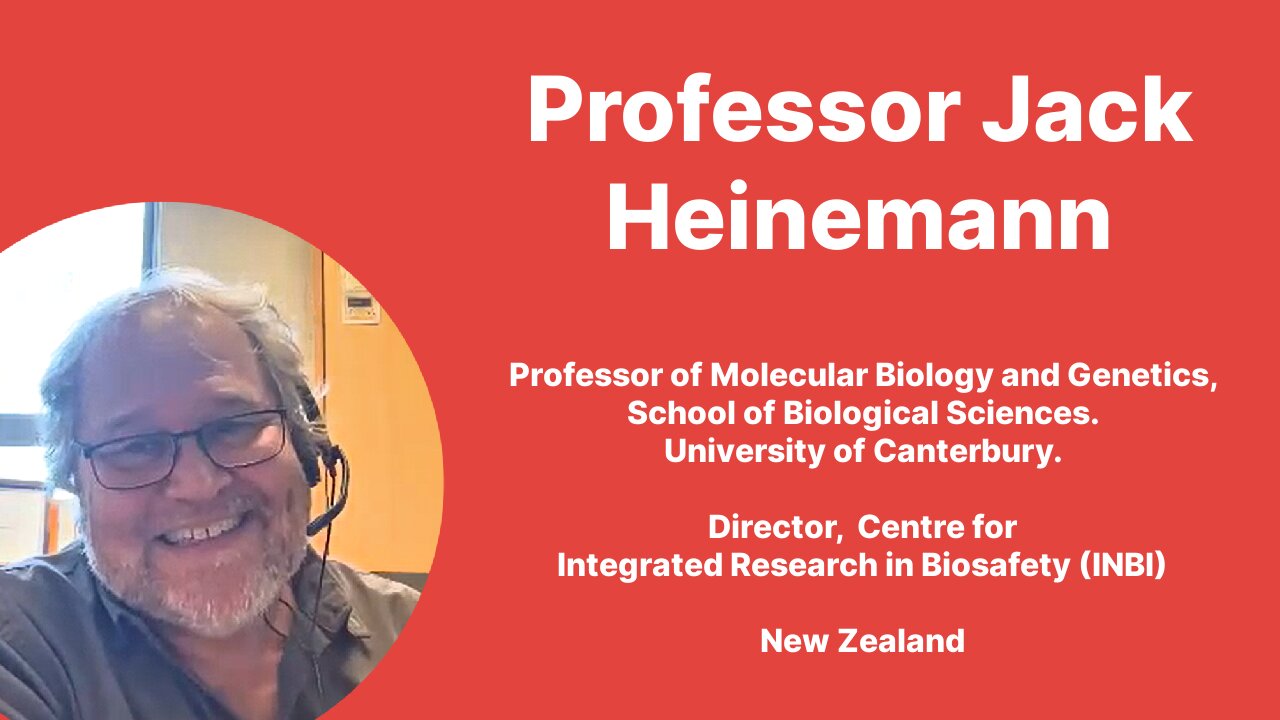Premium Only Content

Biotechnology - Risk that scales up as efficiency increases. Heinemann on risk management & policy.
Professor Jack Heinemann PhD Molecular Biology (Oregon), BSc(hons) Biochemistry and Molecular Biology.
Professor of Molecular Biology and Genetics, (School of Biological Sciences). University of Canterbury. Director, Centre for Integrated Research in Biosafety (INBI) UC.
This interview is essential viewing for scholars, scientists & policy-makers interested in ethics, biotech, policy & the stewardship of biotech. Have you ever wondered about the ways new biotechnologies are speeding up, the efficiency of production increases, which inevitably increase tech output into the environment? How then do we judge risk? The product is a hazard - but how do we identify the potential for a hazard (the product) to cause harm?
Harm is a complex equation of the potential to cause harm [x] where a technology can cause harm. Risk is not the same as hazard. This is why risk assessment is so important. The potential for risk to scale up, what happens at scale - the scale gearing - is key.
As Heinemann notes 'Where harm can accumulate at scale transition, that's precisely where regulation is a solution to mitigate risks... if we say the technique is inherently safe & no product has to be regulated, then I can use those techniques out in the field. By deregulating the hazard, which is the organism I intend to change, unless you have commensurate regulations on the process, you deregulate when & how people use these techniques.'
This really important issue with Professor Jack Heinemann discusses complex scientific, & ethical issues critical for stewardship of biotech, including common assumptions & the dilemma of tech promises. It contains insight that can help look at risk with other, non-biotech technologies. These issues are often neglected in public discussions. Yet how we steward technology impacts the potential for benefit or harm. The case study of null segregants forms an important background to the discussion.
Paper under discussion: Heinemann JA, Clark K, Hiscox TC, McCabe AW and Agapito-Tenfen SZ (2023), Are null segregants new combinations of heritable material and should they be regulated? Front. Genome Ed. 4:1064103. doi: 10.3389/fgeed.2022.1064103
Professor Heinemann was interviewed by JR Bruning (sociologist) of Physicians & Scientists for Global Responsibility (PSGR), a New Zealand based charity, in January 2023.
For more interviews of scientists & doctors, please go to PSGR.org.nz
-
 4:40
4:40
GritsGG
13 hours agoTwo Easter Eggs on Call of Duty Warzone!
7.42K1 -
 2:08:19
2:08:19
Side Scrollers Podcast
20 hours agoNetflix Execs to TESTIFY Over LGBTQ Agenda + IGN DESTROYS Xbox Game Pass + More | Side Scrollers
56.1K15 -
 5:08:55
5:08:55
Dr Disrespect
18 hours ago🔴LIVE - DR DISRESPECT - BABY STEPS - THE VERY VERY LAST CHAPTER
124K17 -
 10:28
10:28
BlabberingCollector
14 hours agoAsk Blabs, Episode 5 | Answering Your Wizarding World Related Questions
7.93K1 -
 18:09
18:09
Forrest Galante
5 days agoI Survived 24 Hours In The World's Deadliest Jungle
187K30 -
 LIVE
LIVE
Lofi Girl
2 years agoSynthwave Radio 🌌 - beats to chill/game to
386 watching -
 2:15:09
2:15:09
Badlands Media
18 hours agoOnlyLands Ep. 27: Power Hour Hangover, Trump’s Wartime Shift, and Portland in Flames
113K26 -
 22:21
22:21
DeVory Darkins
8 hours ago $17.63 earnedRioters attack Portland ICE Facility as Democrats make shocking admission
22.8K97 -
 2:06:06
2:06:06
TimcastIRL
10 hours agoTrump DOJ Announces INTERVENTION In Portland Over Nick Sortor Arrest | Timcast IRL
238K394 -
 6:53:58
6:53:58
SpartakusLIVE
12 hours ago#1 All-American HERO with LUSCIOUS hair and AVERAGE forehead brings Friday Night HYPE
68.9K7
